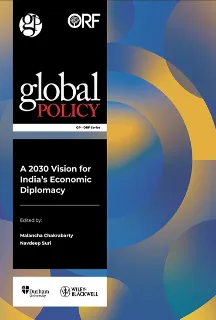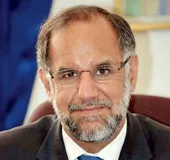Former United Nations (UN) Secretary General Ban Ki Moon described the adoption in 2015 of the 2030 Agenda for Sustainable Development as “a defining moment in human history” (1). World leaders had committed to a 15-year global action plan to end poverty, reduce inequalities, protect the environment, and build peaceful societies. Five years since that commitment, the COVID-19 pandemic upended the global order; countries closed borders and instituted lockdown measures, severely and adversely impacting lives and livelihoods everywhere. Governments are now confronted with a massive health crisis, a socioeconomic crisis, and geopolitical rivalry.
According to International Monetary Fund (IMF) estimates, global output and global trade contracted by 3.5 percent and 9.6 percent respectively in 2020 (2). IMF projects a recovery based on additional policy support in large economies and a strengthening of economic activity on the back of a successful roll-out of vaccines, but global activity is likely to remain below pre-COVID-19 levels and the strength of the projected recovery will vary across countries. The most severe impact of the pandemic was on jobs and livelihoods. According to International Labour Organisation estimates, about 5.4 percent of global working hours were lost in the first quarter of 2020, equivalent to 155 million full-time jobs (3). Even a stronger-than-expected recovery will not lead to a complete restoration of all jobs lost during the pandemic. In developing countries, a substantial proportion of workers are employed in the informal sector and lack social protection and income support measures, and as a result, many households risk falling into poverty. The pandemic has dealt a heavy blow to the sustainable development agenda. Many of the gains made in recent decades in the areas of health, education, hunger and poverty are being offset by the pandemic. For instance, the UN estimates that nearly 71 million people were pushed into extreme poverty in 2020 (4).
Not only has COVID-19 set back efforts to realise the Sustainable Development Goals (SDGs) but there is also little clarity on what kind of global order will emerge in the aftermath of the pandemic. Economic nationalism and trade protectionism is on the rise, and even UN Secretary General Antonio Guterres has criticised such actions, saying “The pandemic is a clear test of international cooperation — a test we have essentially failed (5).” Long before the COVID-19 vaccinations had completed clinical trials, several advanced countries like the US, UK, Japan, Canada and the European Union (EU) had procured millions of doses of the vaccines. Developed countries are prioritising their vaccination programmes while many of the poorest countries are struggling to procure vaccine doses. Long hailed as the ‘pharmacy of the world’, India is exporting vaccines as grants to poor countries under its ‘Vaccine Maitri’ programme (6). As a developing country with a large population, India is facing numerous challenges in the wake of the pandemic. Yet it came forward to help other countries and supplied food aid to African countries and essential medicines, test kits and other equipment to over 90 countries.
Over a year since the pandemic hit, it is clear that the global political and economic landscape has been completely altered. The old ways of interacting with the world are unlikely to work in the post-pandemic world, and India must rethink its economic diplomacy programme for the next decade. So far, India’s economic diplomacy has largely been anchored in its neighbourhood and has been shaped by solidarity with existing associations and partnerships. Although international cooperation and solidarity will remain the guiding principles, India’s future economic diplomacy will have to be located in a new geopolitical dimension that goes far beyond the impulse of the Bandung era. India will need to craft new strategies for engagement in the global economy and forge new alliances.
While building its new economic diplomacy programme for the next decade, India must be mindful of critical challenges like climate change, food insecurity and the disruptions caused by new technology. With a large young population, a faltering economy and huge development challenges, India is at a critical point in its growth trajectory. To promote its development interests, India must overhaul its approach to economic diplomacy. It must move beyond government-to-government negotiations and agreements to include more plural and diverse stakeholders, such as representatives from the private sector, academia, philanthropic institutions and civil society, most of whom will be operating in distant locations. Economic diplomacy necessitates a collective beyond the government that will place brand India at the centre of all diplomatic relations.
Just as China brought to the economic diplomacy table its gargantuan infrastructure capabilities, the US its engineering, design and tech prowess, and the EU offered regulatory and capacity building, India must bring a core offering that encapsulates exactly what makes ‘Brand India’ unique. India became a service sector economy while still a developing nation; it is only prudent to see services as a ‘global public good’ that India can provide to the world. Brand India has much to offer—from vaccines and affordable medicines to sustainable development solutions and low-cost renewable energy opportunities. The economic diplomacy architecture must now start engaging with what the country can offer to the world while keeping the SDG and climate agenda as its core, and India Tech as a vital offering that will underpin India’s growth story in the Fourth Industrial Revolution.
Given the existing global challenges and India’s international aspirations, this volume aims to spell out what India’s economic diplomacy should look like over the next decade. Section I paves a roadmap for India’s relations with major countries and geographies. Dhruva Jaishankar situates India’s relationship with the US, India’s most important economic partner, along five dimensions–trade, migration, capital flows, technology, and standards and regulations. Madhu Bhalla explores the future of India’s economic partnership with China in the wake of the Ladakh standoff, India’s blocking of Chinese apps, and the heightened discourse around decoupling from Chinese-dominated supply chains. Ankita Dutta trains the spotlight on India’s economic and trade relations with the EU and the growing importance of India-EU development partnerships. Natasha Jha Bhaskar examines India’s growing centrality in the Indo-Pacific region and its ability to build an inclusive and integrated region with like-minded countries. Talmiz Ahmad discusses India’s relations with the Gulf and recommends closer partnership in several new areas such as clean energy and digitisation. Malancha Chakrabarty traces India’s growing economic engagement with Africa, India’s oldest ally, and suggests ways to invigorate economic and development links with the continent.
Section II a ttempts to outline India’s policy position on key issues. The pandemic has exacerbated the twin challenges of food and nutrition security, with serious implications on the ability to achieve the second Sustainable Development Goal (SDG), zero hunger. Priya Rampal highlights India’s vulnerability to food insecurity and agrarian crisis, and its role in global food security through food aid and technology partnerships. The pandemic has also elevated the importance of health in the foreign policy agenda. Priyanka Pandit asserts the centrality of global health issues in the discourse on economy, politics, society, foreign policy and security. Mohan Kumar provides an Indian perspective on how the World Trade Organization can be revived and the need for a new round of trade negotiations anchored in the SDGs. Karishma Banga highlights the importance of upgrading global value chains and digital servicification of manufacturing exports for India. Arindrajit Basu focuses on the most hotly contested contemporary issue—data governance. His chapter discusses the criticality of ‘data sovereignty’, a vision that supports the assertion of sovereign writ over data generated by citizens from within a country’s physical boundaries. Joyashree Roy, Nandini Das and Shreya Shome focus on the role of development diplomacy in the achievement of the SDGs and the role India can play as a development partner in ushering in sustainable development in other countries by sharing its own success stories. In addition to its impacts on global growth and development, the COVID-19 pandemic has dealt a heavy blow to international labour mobility. Sangeet Jain contends the need for economic diplomacy establishments to revamp their thinking about labour mobility in light of the dramatic changes in the nature of work and labour force requirements.
Section III attempts to put forth a prospective agenda for India’s economic diplomacy establishment. Navdeep Suri and Anurag Reddy study the key drivers of India’s development cooperation and examine the role that new actors, such as technology start-ups, social entrepreneurs and civil society organisations, can play in India’s development assistance programmes. India’s economic diplomacy is shaped by solidarity with past associations and has largely been anchored in its immediate neighbourhood and Africa. Vikrom Mathur asserts that India needs a robust institutional architecture for development cooperation in the next decade. He advocates five major approaches to achieve this goal—a Development Cooperation Act passed by parliament, the establishment of an independent development partnership agency, greater private sector and civil society engagement, multilateralism and plurilateralism.
Read the full publication here.
The views expressed above belong to the author(s). ORF research and analyses now available on Telegram! Click here to access our curated content — blogs, longforms and interviews.

 PDF Download
PDF Download



 PREV
PREV



